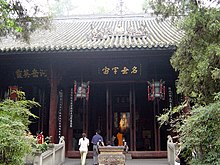Zhuge Liang
Zhuge Liang ( Chinese 諸葛亮 / 诸葛亮 , Pinyin Zhūgě Liàng , IPA ( standard Chinese) [ [d̥ʐ̥u5 ɡ̊ɤ214 li̯ɑŋ51] ], Jyutping Zyu 1 got 3 Loeng 6 , * 181 ; † 234 , first name (Míng) Liàng - 亮 , major name (Zì) Kǒngmíng - 孔明 , honorary name (Hào) Wòlóng - 臥龍 / 卧龙 - "sleeping dragon " or Fúlóng 伏龍 / 伏龙 - "hidden dragon"), was a politician, strategist, essayist and inventor at the time of the three kingdoms in ancient China . Because of his achievements in the military field, he was respectfully given the title Zhūgě Wǔhóu - 諸葛 武侯 / 诸葛 武侯 - "Zhūgě - Prince of the Art of War"
At the end of the Han dynasty , the power of the Han emperor fell apart. Many warlords divided up the country. Liu Bei , who claimed to be a distant relative of the Han imperial family and until then had been a plaything of the warlords, heard of Zhuge Liang's enormous intellect. As a result, despite his high social standing, he went to Zhuge Liang's farm three times to persuade him to become his advisor.
On his first diplomatic mission, Zhuge Liang was able to persuade Sun Quan , who had seized the land south of the Yangtze River, to enter into an alliance with Liu Bei so that they could jointly bring together Cao Cao , who had been able to unite northern China, and the emperor used as a puppet, could beat 208 in the Battle of the Red Rock ( 赤壁 之 戰 / 赤壁 之 战 ).
After that, on the advice of Zhuge Liang, Liu Bei conquered Sichuan Province , which is difficult to conquer due to its mountainous surroundings. This established the three kingdoms of the Wei Dynasty , the Shu Han (also known as the Later Han Dynasty) and the Wu Dynasty .
Zhuge Liang tried tactics, diplomacy and politics to win over the minorities on the country's border, to rebuild the rather weak country and led six futile northern expeditions to conquer China for the Shu dynasty. On the last of these campaigns he died of exhaustion in 234.
In China, Zhuge Liang was granted deity status. For the people he is considered a particularly wise man who remained close to the people and free of corruption, even when he became chancellor of his country. His name is synonymous with a brilliant tactician. The veneration for him is so great that he is worshiped with his master, Liu Bei, in the same temple that is popularly called his name.
During his campaigns, he wrote two famous reports that are required reading of Ancient Chinese in schools in China . During his campaigns he invented some devices, for example a small hot air balloon driven by a candle, used as a signal , which is still called the Kongming lantern or sky lantern in China today , or a crossbow device ( repeating crossbow ), with which several bolts at the same time could be shot down.
The stories about Zhuge Liang, Cao Cao, Liu Bei and others are part of the 36 stratagems , a Chinese collection of historical tactics and deceptions (cunning), which are very well known in China .
literature
Zhuge Liang: The General's Dao: Military Leadership and Strategy in Ancient China . Translated by Dr. Martin Boedicker. CreateSpace Independent Publishing Platform 2016, ISBN 978-1533141309
Web links
- Literature by and about Zhuge Liang in the catalog of the German National Library
- Zhuge Liang style-name Kongming A history of Zhuge Liang and his writings. Including a guide to historic sites in China connected with Zhuge Liang
| personal data | |
|---|---|
| SURNAME | Zhuge, Liang |
| ALTERNATIVE NAMES | 諸葛亮, Kongming |
| BRIEF DESCRIPTION | Politician and strategist during the Three Kingdoms Period of China |
| DATE OF BIRTH | 181 |
| DATE OF DEATH | 234 |

